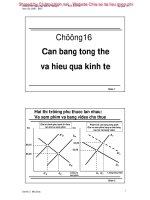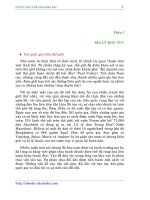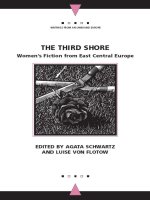The lee shore
Bạn đang xem bản rút gọn của tài liệu. Xem và tải ngay bản đầy đủ của tài liệu tại đây (988.11 KB, 243 trang )
TheProjectGutenbergeBook,TheLeeShore,byRoseMacaulay
ThiseBookisfortheuseofanyoneanywhereatnocostandwith
almostnorestrictionswhatsoever.Youmaycopyit,giveitawayor
re-useitunderthetermsoftheProjectGutenbergLicenseincluded
withthiseBookoronlineatwww.gutenberg.net
Title:TheLeeShore
Author:RoseMacaulay
ReleaseDate:August28,2005[eBook#16612]
Language:English
Charactersetencoding:ISO-8859-1
***STARTOFTHEPROJECTGUTENBERGEBOOKTHELEESHORE***
E-textpreparedbySuzanneShell,MaryMeehan,
andtheProjectGutenbergOnlineDistributedProofreadingTeam
( />
THELEESHORE
BYR.MACAULAY
1912
HODDER&STOUGHTON
NEWYORK
GEORGEH.DORANCOMPANY
TOP.R.
That division, the division of those who have and those who have
not,runssodeepasalmosttoruntothebottom.
Contents
CHAPTERI--AHEREDITARYBEQUEST
CHAPTERII--THECHOICEOFACAREER
CHAPTERIII--THEHOPES
CHAPTERIV--THECOMPLETESHOPPER
CHAPTERV--THESPLENDIDMORNING
CHAPTERVI--HILARY,PEGGY,ANDTHEBOARDERS
CHAPTERVII--DIANA,ACTÆON,ANDLORDEVELYN
CHAPTERVIII--PETERUNDERSTANDS
CHAPTERIX--THEFATINTHEFIRE
CHAPTERX--THELOSSOFAPROFESSION
CHAPTERXI--THELOSSOFANIDEA
CHAPTERXII--THELOSSOFAGOBLETANDOTHERTHINGS
CHAPTERXIII--THELOSSOFTHESINGLESTATE
CHAPTERXIV--PETER,RHODA,ANDLUCY
CHAPTERXV--THELOSSOFAWIFE
CHAPTERXVI--ALONGWAY
CHAPTERXVII--MISCHANCESINTHERAIN
CHAPTERXVIII--THEBREAKING-POINT
CHAPTERXIX--THENEWLIFE
CHAPTERXX--THELASTLOSS
CHAPTERXXI--ONTHESHORE
THELEESHORE
CHAPTERI
AHEREDITARYBEQUEST
During the first week of Peter Margerison's first term at school, Urquhart
suddenlystepped,aradiantfigureontheheroicscale,outofthekaleidoscopic
mazeofbemusinglightsandcoloursthatwasPeter'svisionofhisnewlife.
Peter,seeingUrquhartinauthorityonthefootballfield,asked,"Whoisit?"and
wastold,"Urquhart,ofcourse,"withtheimplication"Whoelsecoulditbe?"
"Oh," Peter said, and blushed. Then he was told, "Standing right in Urquhart's
waylikethat!Urquhartdoesn'twanttobestaredatbyallthesillylittlekidsin
thelower-fourth."ButUrquhartwas,asamatteroffact,probablyusedtoit.
So that was Urquhart. Peter Margerison hugged secretly his two pieces of
knowledge;sosecrettheywere,andsoenormous,thatheswelledvisiblywith
them;thereseemedsomedangerthattheymightevenbursthim.Thatgreatman
wasUrquhart.Urquhartwasthatgreatman.Putso,thetwopiecesofknowledge
may seem to have a certain similarity; there was in effect a delicate
discrimination between them. If not wholly distinct one from the other, they
wereanyhowtwoseparateaspectsofthesamestartlingandrathermagnificent
fact.
Thentherewasanotheraspect:didUrquhartknowthathe,Margerison,wasin
fact Margerison? He showed no sign of such knowledge; but then it was
naturallynotpartofhisbusinesstoconcernhimselfwithsillylittlekidsinthe
lower-fourth.Peterneverexpectedit.
But a few days after that, Peter came into the lavatories and found Urquhart
there, and Urquhart looked round and said, "I say, you—Margerison. Just cut
down to the field and bring my cap. You'll find it by the far goal, Smithson's
ground. You can bring it to the lavatories and hang it on my peg. Cut along
quick,oryou'llbelate."
Peter cut along quick, and found the velvet tasselled thing and brought it and
hungitupwiththecareduetoathingsopreciousasafifteencap.Theschool
bellhadclangedwhilehewasdownonthefield,andhewaslateandhadlines.
That didn't matter. The thing that had emerged was, Urquhart knew he was
Margerison.
Afterthat,UrquhartdidnothaveoccasiontohonourMargerisonwithhisnotice
for some weeks. It was, of course, a disaster of Peter's that brought them into
personalrelations.Throughouthislife,Peter'srelationswereapttobebasedon
some misfortune or other; he always had such bad luck. Vainly on Litany
Sundaysheputuphispetitiontobedelivered"fromlightningandtempest,from
plague,pestilence,andfamine,frombattleandmurder,andfromsuddendeath."
Disastersseemedtocrowdtheroadsonwhichhewalked;sofrequentwerethey
andsotragicthatlifecouldscarcelybelivedinsoberearnest;itwas,forPeter
the comedian, a tragi-comic farce. Circumstances provided the tragedy, and
temperamentthefarce.
Anyhow,onedayPetertumbledontothepointofhisrightshoulderandlayon
hisface,hisarmcrookedcuriouslyathisside,remarkingthathedidn'tthinkhe
washurt,onlyhisarmfeltfunnyandhedidn'tthinkhewouldmoveitjustyet.
People pressed about him; suggested carrying him off the field; asked if he
thought it was broken; asked him how he felt now; asked him all manner of
things,noneofwhichPeterfeltcompetenttoanswer.Hisonlyremark,delivered
in a rather weak and quavering voice, was to the effect that he would walk
directly,onlyhewouldliketostaywherehewasalittlelonger,please.Hesaidit
very politely. It was characteristic of Peter Margerison that misfortune always
made him very polite and pleasant in his manners, as if he was saying, "I am
sorrytobesotiresomeandfeeble:dogoonwithyourownbusinesses,youmore
fortunateandcapablepeople,andnevermindme."
As they stood in uncertainty about him, someone said, "There's Urquhart
coming,"andUrquhartcame.Hehadbeenplayingonanotherground.Hesaid,
"What is it?" and they told him it was Margerison, his arm or his shoulder or
something,andhedidn'twanttobemoved.Urquhartpushedthroughthecrowd
that made way for him, and bent over Margerison and felt his arm from the
shouldertothewrist,andMargerisonbitattheshortgrassthatwasagainsthis
face.
"That's all right," said Urquhart. "I wanted to see if it was sprained or broken
anywhere.It'snot;it'sjustaput-outshoulder.Ididthatonce,andtheyputitin
onthefield;itwasquiteeasy.Itoughttobedoneatonce,beforeitgetsstiff."He
turnedPeteroveronhisback,andtheysawthathewaspale,andhisforehead
was muddy where it had pressed on the ground, and wet where perspiration
stoodonit.Urquhartwasunlacinghisownboot.
"I'mgoingtohaulitinforyou,"hetoldPeter."It'squiteeasy.It'llhurtabit,of
course,butlessnowthanifit'sleft.It'llslipinquiteeasily,becauseyouhaven't
muchmuscle,"headded,lookingatthefrail,thin,crookedarm.Thenheputhis
stockinged foot beneath Peter's arm-pit, and took the arm by the wrist and
straightened it out. The other thin arm was thrown over Peter's pale face and
working mouth. The muddy forehead could be seen getting visibly wetter.
Urquhart threw himself back and pulled, with a long and strong pull. Sharp
gaspscamefrombeneaththeflung-upleftarm,throughteeththatwereclenched
over a white jersey sleeve. The thin legs writhed a little. Urquhart desisted,
breathingdeeply.
"Sorry,"hesaid;"onemore'lldoit."Theonemorewaslongerandstronger,and
turnedthegaspsintosemi-groans.ButasUrquharthadpredicted,itdidit.
"There,"saidUrquhart, restingandlookingpleased,ashealwaysdidwhen he
hadaccomplishedsomethingneatly."Heardtheclick,didn'tyou?It'sinallright.
Sorrytohurtyou,Margerison;youwerejollysporting,though.NowI'mgoing
totieitupbeforewegoin,orit'llbeoutagain."
SohetiedPeter'sarmtoPeter'sbodywithhisneckscarf.Thenhetookupthe
smalllightfigureinhisarmsandcarrieditfromthefield.
"Hurtmuchnow?"heasked,andPetershookanuntruthfulheadandgrinnedan
untruthful and painful grin. Urquhart was being so inordinately decent to him,
andhefelt,eveninhispain,soextremelyflatteredandexaltedbysuchdecency,
that not for the world would he have revealed the fact that there had been a
secondfaintclickwhilehisarmwasbeingboundtohisside,andanexcruciating
jarthatmadehimsuspecttheabominablethingtobeoutagain.Hedidn'tknow
how the mechanism worked, but he was sure that the thing Urquhart had with
such labour hauled in had slipped out and was disporting itself at large in
unlawfulterritory.Hesaidnothing,alittlebecausehereallydidn'tthinkhecould
quitemakeuphismindtoanotherlongandstrongpull,butchieflybecauseof
Urquhart and his immense decency. Success was Urquhart's rôle; one did not
willinglyimaginehimfailing.Ifheroesfail,onemustnotletthemknowit.Peter
shuthiseyes,and,throughhisrathersickvisionoftrespassingrabbitspopping
inandoutthroughholesinafence,knewthatUrquhart'sarmswerecarryinghim
very strongly and easily and gently. He hoped he wasn't too heavy. He would
havesaidthathecouldwalk,onlyhewasratherafraidthatifhesaidanythinghe
mightbesick.Besides,hedidn'treallywanttowalk;hisshoulderwashurting
himverymuch.HewassowhiteaboutthecheeksandlipsthatUrquhartthought
hehadfainted.
After a little while, Urquhart was justified in his supposition; it was
characteristicofPetertoconvert,aspromptlyaswasfeasible,anyslighterrorof
Urquhart'sintotruth.SoPeterknewnothingwhenUrquhartcarriedhimindoors
anddeliveredhimintootherhands.Heopenedhiseyesnextonthedoctor,who
was untying his arm and cutting his sleeve and saying cheerfully, "All right,
youngman,allright."
Thenextthinghesaidwas,"Iwastoldithadbeenputin."
"Yes,"saidPeterlanguidly."Butitcameoutagain,Ithink."
"Soitseems.Didn'ttheydiscoverthatdownthere?"
Petermovedhisheadlimply,meaning"No."
"But you did, did you? Well, why didn't you say so? Didn't want to have it
hauled at again, I suppose? Well, we'll have it in directly. You won't feel it
much."
So the business was gone through again, and this time Peter not only half but
quitegroaned,becauseitdidn'tmatternow.
When the thing was done, and Peter rigid and swathed in bed, the doctor was
recalledfromthedoorbyafaintvoicesaying,"Willyoupleasenottellanyoneit
cameoutagain?"
"Whynot?"Thedoctorwaspuzzled.
"Don'tknow,"saidPeter,afterfindingthathecouldn'tthinkofareason.Butthen
hegavethetrueone.
"Urquhartthoughthe'dgotitinallright,that'sall."
"Oh."Thedoctorwaspuzzledstill."Butthat'sUrquhart'sbusiness,notyours.It
wasn'tyourfault,youknow."
"Please,"saidPeterfromthebed."Doyoumind?"
The doctor looked and saw feverish blue lamps alight in a pale face, and
soothingly said he did not mind. "Your shoulder, no one else's, isn't it?" he
admitted. "Now you'd better go to sleep; you'll be all right directly, if you're
carefulnottomoveitorlieonitoranything."
Peter said he would be careful. He didn't at all want to move it or lie on it or
anything.Helayandhadwakingvisionsofthepoppingrabbits.Buttheymight
popastheyliked;Peterhidabetterthinginhisinmostsoul.Urquharthadsaid,
"Sorrytohurtyou,Margerison.Youwerejollysporting,though."Inthenightit
seemed incredible that Urquhart had stooped from Valhalla thus far; that
Urquharthadpulledinhisarmwithhisownhandsandcalledhimsportingtohis
face. The words, and the echo of the soft, pleasant, casual voice, with its
unemphasisedintonations,spreadliftingwingsforhim,andborehimabovethe
achingpainthatstayedwithhimthroughthenight.
Next morning, when Peter was wishing that the crumbs of breakfast that got
betweenone'sbackandone'spyjamaswerelesssharp-cornered,andwondering
why a dislocated shoulder should give one an aching bar of pain across the
forehead,andfeelingverysadbecausealetterfromhomehadjustinformedhim
that his favourite guinea-pig had been trodden on by the gardener, Urquhart
cametoseehim.
Urquhartsaid,"Hullo,Margerison.Howareyouthismorning?"andPetersaid
hewasverynearlyallrightnow,thanksverymuch.Headded,"Thanksawfully,
Urquhart,forputtingitin,andseeingaftermeandeverything."
"Oh,that'sallright."Urquhart'ssmilehadthesamepleasantqualityashisvoice.
HehadneversmiledatPeterbefore.Peterlayandlookedathim,thebluelamps
very bright in his pale face, and thought what a jolly voice and face Urquhart
had. Urquhart stood by the bed, his hands in his pockets, and looked rather
pleasantly down at the thin, childish figure in pink striped pyjamas. Peter was
fourteen, and looked less, being delicate to frailness. Urquhart had been rather
shockedbyhisextremelightness.Hehadalsobeenpleasedbyhispluck;hence
the pleasant expression of his eyes. He was a little touched, too, by the
unmistakableadmirationintheover-brightblueregard.Urquhartwasnotunused
to admiration;butherewassomethingverywhole-hearted andrather pleasing.
Margerisonseemedratheranicelittlekid.
Then, quite suddenly, and still in his pleasant, soft, casual tones, Urquhart
draggedPeter'simmensesecretintothelightofday.
"Howareyourpeople?"hesaid.
Peterstammeredthattheywerequitewell.
"Of course," Urquhart went on, "I don't remember your mother; I was only a
babywhenmyfatherdied.ButI'vealwaysheardalotabouther.Isshe..."
"She's dead, you know," broke in Peter hastily, lest Urquhart should make a
mistakeembarrassingtohimself."Alongtimeago,"headded,againanxiousto
saveembarrassment.
"Yes—ohyes."Urquhart,fromhismanner,mightormightnothaveknown.
"Ilivewithmyuncle,"Peterfurthertoldhim,thusdelicatelyandunobstrusively
supplying the information that Mr. Margerison too was dead. He omitted to
mentionthedateofthisbereavement,havingalwaysadelicatesenseofwhatdid
and did not concern his hearers. The decease of the lady who had for a brief
periodbeenLadyHughUrquhart,mightbesupposedtobeofacertaininterest
to her stepson; that of her second husband was a private family affair of the
Margerisons.
(TheUrquhart-Margerisonconnection,whichmaypossiblyappearcomplicated,
wasreallyverysimple,andalsoofexceedinglylittleimportancetoanyonebut
Peter; but in case anyone feels a desire to have these things elucidated, it may
here be mentioned that Peter's mother had made two marriages, the first being
with Urquhart's father, Urquhart being already in existence at the time; the
second with Mr. Margerison, a clergyman, who was also already father of one
son, and became Peter's father later. Put so, it sounds a little difficult, chiefly
because they were all married so frequently and so rapidly, but really is
simplicityitself.)
"Ilivewithmyuncletoo,"Urquhartsaid,andthefactformedashadowybond.
But Peter's tone had struck a note of flatness that faintly indicated a lack of
enthusiasm as to the ménage. This note was, to Peter's delicately attuned ears,
absentfromUrquhart'svoice.PeterwonderedifLordHugh'sbrother(supposing
ittobeapaternaluncle)resembledLordHugh.ToresembleLordHugh,Peter
had always understood (till three years ago, when his mother had fallen into
silenceonthatandallothertopics)wastobeofacharm....Onespokeofitwith
a faint sigh. And yet of a charm that somehow had lacked something, the
intuitivePeterhaddivined;perhapsithadbeentoosplendid,toofortunate,fora
lady who had loved all small, weak, unlucky things. Anyhow, not long after
LordHugh'sdeath(hewaskilledouthunting)shehadmarriedMr.Margerison,
thepoorestclergymanshecouldfind,andthemostdevotedtothetendingofthe
unprosperous.
Peter remembered her—compassionate, delicate, lovely, full of laughter, with
somethinginthedanceofhervividdark-blueeyesthathintedatradiantandsad
memories.ShehadlovedLordHughforagloriousandbriefspaceoftime.The
lovehadperhapsdescended,ahereditarybequest,withthedeepblueeyes,toher
son. Peter would have understood the love; the thing he would not have
understood was the feeling that had flung her on the tide of reaction at Mr.
Margerison'sfeet.Mr.Margerisonwasahardliverandatremendousgiver.Both
thesethingshadcometomeanagreatdealtoSylviaUrquhart—muchmorethan
theyhadmeanttothegirlSylviaHope.
And hence Peter, who lay and looked at Lord Hugh Urquhart's son with wide,
brighteyes.Withjustsucheyes—onlyholding,letushope,anadorationmore
masked—SylviaHopehadlongagolookedatLordHugh,seeinghimbeautiful,
delicately featured, pale, and fair of skin, built with a strong fineness, and
smilingwithpleasanteyes.LordHugh'sbeautyofpersonandcharmofmanner
hadpossibly(notcertainly)meantmoretoSylviaHopethanhisson'smeantto
herson;andhisprowessatfootball(ifhehadany)hadalmostcertainlymeant
less.But,apartfromtheglamourofphysicalskillandstrengthandtheofficial
gloryofcaptainship,thesamecharmworkedonmotherandson.Thesoft,quick,
unemphasised voice, with the break of a laugh in it, had precisely the same
disturbingeffectonboth.
"Well,"Urquhartwassaying,"whenwilltheyletyouplayagain?Youmustbuck
up and get all right quickly.... I shouldn't wonder if you made a pretty decent
three-quarter sometime.... You ought to use your arm as soon as you can, you
know, or it gets stiff, and then you can't, and that's an awful bore.... Hurt like
anythingwhenIhauleditin,didn'tit?Butitwasmuchbettertodoitatonce."
"Oh,much,"Peteragreed.
"Howdoesitfeelnow?"
"Oh,allright.Idon'tfeelitmuch.Isay,doyouthinkIoughttouseitatonce,in
caseitgetsstiff?"Peter'seyeswerealittleanxious;hedidn'tmuchwanttouseit
atonce.
But Urquhart opined that this would be over-great haste. He departed, and his
lastwordswere,"Youmustcometobreakfastwithmewhenyou'reupagain."
Peterlay,glorified,andthoughtitallover.Urquhartknew,then;hehadknown
from the first. He had known when he said, "I say, you, Margerison, just cut
downtothefield..."
NotforamomentdiditseematallstrangetoPeterthatUrquhartshouldhave
hadthisknowledgeandgivennosigntillnow.What,afterall,wasittoahero
that the family circle of an obscure individual such as he should have
momentarily intersected the hero's own orbit? School has this distinction—
familiestakeabackplace;oneisjudgedonone'sownindividualmerits.Peter
wouldmuchratherthinkthatUrquharthadcometoseehimbecausehehadput
hisarmoutandUrquharthadputitin(reallythough,onlytemporarilyin)than
becausehismotherhadoncebeenUrquhart'sstepmother.
Peter's arm did not recover so soon as Urquhart's sanguineness had predicted.
Perhaps he began taking precautions against stiffness too soon; anyhow he did
notthattermmakeadecentthree-quarter,oranysortofathree-quarteratall.It
always took Peter a long time to get well of things; he was easy to break and
hard to mend—made in Germany, as he was frequently told. So cheaply made
washethathecouldperformnothing.Defeateddreamslivedinhiseyes;butto
lightthemthereburnedperpetuallytheblueandluminouslampsofundefeated
mirth,andalsoanimmensefriendlinessforlifeandmankindandthedelightful
world.LiketheyoungknightAgenore,Petertheunluckywasofamindhaving
nolimitsofhope.Overtheblueandfriendlyeyesthatlitthesmallpaleface,the
halfwistfulbrowswerecockedwithakindofwhimsicalandgentlehumour,the
same humour that twitched constantly at the corners of his wide and flexible
mouth.Peterwasnotabeautifulperson,butoneliked,somehow,tolookathim
and to meet his half-enquiring, half-amused, wholly friendly and sympathetic
regard. By the end of his first term at school, he found himself unaccountably
popular. Already he was called "Margery" and seldom seen by himself. He
enjoyedlife,becausehelikedpeopleandtheylikedhim,andthingsingeneral
wereratherjollyandveryfunny,evenwithadislocatedshoulder.Alsothegreat
Urquhartwould,whenheremembered,takealittlenoticeofPeter—enoughto
inflate the young gentleman's spirit like a blown-out balloon and send him
soaringskywards,tofloatgentlydownagainathisleisure.
Towardstheendoftheterm,Peter'shalf-brotherHilarycametovisithim.Hilary
wastallandslimanddarkandratherbeautiful,andhelivedabroadandpainted,
and he told Peter that he was going to be married to a woman called Peggy
Callaghan. Peter, who had always admired Hilary from afar, was rather sorry.
ThewomanPeggyCallaghanwould,hevaguelybelieved,comebetweenHilary
and his family; and already there were more than enough of such obstacles to
intercourse.Butattea-timehesawthewoman,andshewaslargeandfairand
laughing,andcalledhim,inherrich,amusedvoice"littlebrotherdear,"andhe
didnotmindatall,butlikedherandherlaughandhermirthful,lazyeyes.
Peterwasalarge-mindedperson;hedidnotmindthatHilaryworenocollarand
a floppy tie. He did not mind this even when they met Urquhart in the street.
Peter whispered as he passed, "That's Urquhart," and Hilary suddenly stopped
and held out his hand, and said pleasantly, "I am glad to meet you." Peter
blushed at that, naturally (for Hilary's cheek, not for his tie), and hoped that
Urquhartwasn'tmuchoffended,butthatheunderstoodwhathalf-brotherswho
lived abroad and painted were, and didn't think it was Peter's fault. Urquhart
shookhandsquitepleasantly,andwhenHilaryadded,"Wesharedastepmother,
youandI;I'mPeter'shalf-brother,youknow,"heamiablyagreed.Peterhoped
he didn't think that the Urquhart-Margerison connection was being strained
beyond due bounds. Hilary said further, "You've been very good to my young
brother,Iknow,"anditwascharacteristicofPeterthat,evenwhilehelistenedto
this embarrassing remark, he was free enough from self-consciousness to be
thinkingwithakeenthoughundefinedpleasurehowextraordinarilynicetolook
at both Hilary and Urquhart, in their different ways, were. (Peter's love of the
beautiful matured with his growth, but in intensity it could scarcely grow.)
Urquhartwassayingsomethingaboutbadluckandshoulders;itwasdecentof
Urquhart to say that. In fact, things were going really well till Hilary, after
saying, "Good-bye, glad to have met you," added to it the afterthought, "You
mustcomeandstayatmyuncle'splaceinSussexsometime.Mustn'the,Peter?"
Atthesametime—fittingaccompanimenttotheover-boldwords—Petersawa
half-crown, a round, solid, terrible half-crown, pressed into Urquhart's
unsuspectinghand.Oh,horror!Whichwastheworse,theinvitationorthehalfcrown?Petercouldneverdetermine.Whichwasthemoreflagrantindecency—
that he, young Margerison of the lower fourth, should, without any
encouragement whatever, have asked Urquhart of the sixth, captain of the
fifteen, head of his house, to come and stay with him; or that his near relative
should have pressed half-a-crown into the great Urquhart's hand as if he
expectedhimtogoforthwithtothetuck-shopatthecornerandbuytarts?Peter
wriggled,scarletfromhiscollartohishair.
Urquhartwasapoliteperson.Hetookthehalf-crown.Hemurmuredsomething
about being very glad. He even smiled his pleasant smile. And Peter, entirely
unexpectedly to himself, did what he always did in the crises of his singularly
disastrous life—he exploded into a giggle. So, some years later, he laughed
helplessly and suddenly, standing among the broken fragments of his social
reputationandhisprofessionalcareer.Hecouldnothelpit.Whentheworsthad
happened,therewasnothingelseonecoulddo.Onelaughedfromasheersense
ofthecompletenessofthedisaster.Peterhadafunny,extremelyamusedlaugh;
hardlythelaughofaprosperousperson;ratherthatoftheunhorsedknightwho
acknowledges the utterness of his defeat and finds humour in the very fact. It
wasasifmisfortune—andthismisfortuneofthehalf-crownandtheinvitationis
nottobeunder-estimated—sharpenedallthefaculties,neverblunt,bywhichhe
apprehendedhumour.SohelookedfromHilarytoUrquhart,and,mentally,from
bothtohiscoweringself,andexploded.
Urquhart had passed on. Hilary said, "What's the matter with you?" and Peter
recoveredhimselfandsaid"Nothing."Hemighthavecried,withMissEvelina
Anvill,"Oh,mydearsir,Iamshockedtodeath!"Hedidnot.Hedidnoteven
say, "Why did you stamp us like that?" He would not for the world have hurt
Hilary'sfeelings,andvaguelyheknewthatthissplendid,unusualhalf-brotherof
hiswasinsomewaysasensitiveperson.
Hilarysaid,"TheUrquhartsoughttoinviteyoutostay.Theconnectionisreally
close.Ibelieveyourmotherwasdevotedtothatboyasababy.You'dliketogo
andstaythere,wouldn'tyou?"
Peter looked doubtful. He was nervous. Suppose Hilary met Urquhart again....
Direpossibilitiesopened.Nexttimeitmightbe"Petermustgoandstayatyour
uncle's place in Berkshire." That would be worse. Yes, the worst had not
happened, after all. Urquhart might have met Peggy. Peggy would in that case
have said, "You nice kind boy, you've been such a dear to this little brother of
ours, and I hear you and these boys used to share a mamma, so you're really
brothers, and so, of course, my brother too; and what a nice face you've got!"
There were in fact, no limits to what Peggy might say. Peggy was outrageous.
Butitwassurprisinghowmuchonecouldbearfromher.Presumably,Peterused
toreflectinafteryears,whenhehadtobearfromheraverygreatdealindeed,it
wassimplybyvirtueofherbeingPeggy.ItwasthesamewithHilary.Theywere
HilaryandPeggy,andonetookthemassuch.Indeed,onehadto,astherewas
certainlynoalteringthem.AndPeterlovedbothofthemverymuchindeed.
WhenPeterwenthomefortheholidays,hefoundthatHilary'salliancewiththe
womanPeggyCallaghanwasnotsmiledupon.ButthennoneofHilary'sprojects
were ever smiled upon by his uncle, who always said, "Hilary must do as he
likes. But he is acting with his usual lack of judgment." For four years he had
beensayingso,andhesaiditagainnow.ToHilaryhimselfhefurthersaid,"You
can'taffordawifeatall.Youcertainlycan'taffordMissCallaghan.Youhaveno
rightwhatevertomarryuntilyouareearningasettledlivelihood.Youarenotof
thetemperamenttomakeanywomanconsistentlyhappy.MissCallaghanisthe
daughterofanIrishdoctor,andaCatholic."
"Itis,"saidHilary,"themostbeautifulofallthereligions.IfIcouldbringmyself
undertheyokeofanycreedatall..."
"Just so," said his uncle, who was a disagreeable man; "but you can't," and
Hilarytolerantlyleftitatthat,merelyadding,"Therewillbenodifficulty.We
havearrangedallthat.Peggyisnotabigot.Astotherest,Ithinkwemustjudge
forourselves.Ishallbeearningmorenow,Iimagine."
Hilary always imagined that; imagination was his strong point. His initial
mistake was to imagine that he could paint. He did not think that he had yet
paintedanythingverygood;butheknewthathewasjustabouttodoso.Hehad
really the artist's eye, and saw keenly the beauty that was, though he did not
knowit,beyondhisgrasp.Hisuncle, whoknewnothingaboutart,couldhave
toldhimthathewouldneverbeabletopaint,simplybecausehehadneverbeen,
and would never be, able to work. That gift he wholly lacked. Besides, like
youngPeter,heseemedconstitutionallyincapableofsuccess.Awideandquick
receptiveness,aconsiderablepowerofappreciationandassimilation,madesuch
genius as they had; the power of performance they desperately lacked; their
enterprises always let them through. Failure was the tragi-comic note of their
unprosperouscareers.
However, Hilary succeeded in achieving marriage with the cheerful Peggy
Callaghan,andhavingdonesotheywentabroadandlivedanunevenandrather
excitinglifeofalternatesqualorandluxuryinonestoryofwhathadoncebeena
gloriousroseatehomeofVenetiancounts,andwasnowcrumblingtopiecesand
letinflatstothepoor.Hilaryandhiswifeweremostsuitablydomiciledtherein,
environed by a splendid dinginess and squalor, pretentious, tawdry, grandiose,
andsuperblyevadingthecommon.PeggywrotetoPeterinherlargesprawling
hand,"Youdearlittlebrother,Iwishyou'dcomeandlivewithus.Wehavesuch
fun...." That was the best of Peggy. Always and everywhere she had such fun.
She added, "Give my sisterly regards to the splendid hero who shared your
mamma, and tell him we too live in a palace." That was so like Peggy, that
suddenandamusedproddingintothemostsecretintimaciesofone'semotions.
Peggyalwaysdiscernedagreatdeal,andwasblindtoagreatdealmore.
CHAPTERII
THECHOICEOFACAREER
Hilary,stretchinghisslenderlengthwearilyinPeter'sfatarm-chair,wassaying
inhishigh,sweetvoice:
"It'sthemerestpittance,Peter,yoursandmine.TheRobinsonshaveitpractically
all.TheRobinsons.Really,youknow..."
The sweet voice had a characteristic, vibrating break of contempt. Hilary had
alwayshatedtheRobinsons,whonowhaditpracticallyall.Hilarylookedpale
and tired; he had been settling his dead uncle's affairs for the last week. The
Margerisons'unclehadnotbeenalovableman;Hilarycouldnotpretendthathe
hadlovedhim.Peterhad,asfarashehadbeenpermittedtodoso;Peterfoundit
possibletobeattachedtomostofthepeoplehecameacross;hewasapersonof
catholic sympathies and gregarious instincts. Even when he heard how the
Robinsonshaditpracticallyall,heborenoresentmenteitheragainsthisuncleor
the Robinsons. Such was life. And of course he and Hilary did not make wise
useofmoney;thattheyhadalwaysbeentold.
"You'llhavetoleaveCambridge,"Hilarytoldhim."Youhaven'tenoughtokeep
youhere.I'msorry,Peter;I'mafraidyou'llhavetobeginandtrytoearnaliving.
ButIcan'timaginehow,canyou?Hasanypayinglineoflifeeveroccurredto
youaspossible?"
"Never,"Peterassuredhim."ButI'venothadtimetothinkitoveryet,ofcourse.
IsupposedIshouldbeupherefortwoyearsmore,yousee."
AtHilary's"You'llhavetoleaveCambridge,"hisfacehadchangedsharply.Here
was tragedy indeed. Bother the Robinsons.... But after a moment's pause for
recoveryheansweredHilarylightlyenough.Such,again,waslife.Amarvellous
twotermsandahalf,andthenthefamiliarbarredgate.Itwasanoldstory.
Hilary'sthoughtsturnedtohisownsituation.Theynever,totellthetruth,dwelt
verylongonanybodyelse's.
"We," he said, "are destitute—absolutely. It's simply frightful, the wear and
strainofit.Peggy,ofcourse,"headdedplaintively,"isnotagoodmanager.She
likesspending,youknow—andthere'ssoseldomanythingtospend,poorPeggy.
So lifeisdisappointingforher. Thebabies,Ineedn'tsay,aregrowinguplittle
vagabonds.Andtheywillbatheinthecanals,whichisn'trespectable,ofcourse;
thoughoneisrelievedinawaythattheyshouldbatheanywhere."
"Ifhewassellinganypictures,"Peterreflected,"hewouldtellme,"sohedidnot
enquire.Peterhadtactastohisquestions.OneratherneededitwithHilary.But
hewonderedvaguelywhatthebabieshad,atthemoment,togrowupupon,even
aslittlevagabonds.PresentlyHilaryenlightenedhim.
"I edit a magazine," he said, and Peter perceived that he was both proud and
ashamed of the fact. "At least I am going to. A monthly publication for the
entertainment and edification of the Englishman in Venice. Lord Evelyn
Urquhartisfinancingit.YouknowhehastakenuphisresidenceinVenice?A
pleasantcrank.Veniceishislatestcraze.Hebuysglass.And,indeed,mostother
things. He shops all day. It's a mania. When he was young I believe he had a
veryfinetaste.It'sdullednow—afearfullife,astheysay.Well,hislastfancyis
to run a magazine, and I'm to edit it. It's to be called 'The Gem.' 'Gemm'
Adriatica,' you know, and all that; besides, it's more or less appropriate to the
contents. It's to be largely concerned with what Lord Evelyn calls 'charming
things.'ThingsthevisitingEnglishmanlikestohearabout,youknow.Itaimsat
being the Complete Tourist's Guide. I have to get hold of people who'll write
articlesontheDuomomosaics,andthegalleriesandchurchesandpalacesand
so on, and glass and lace and anything else that occurs to them, in a way
calculatedtoappealtothecultivatedBritishresidentorvisitor.Idetestthebreed,
Ineedn'tsay.PamperedhotelPhilistinespretendingtocultureandprofaningthe
sanctuaries, Ruskin in hand. Ruskin. Really, you know.... Well, anyhow, my
mission in life for the present is to minister to their insatiable appetite for
rhapsodisingoverwhattheyfeelitincumbentonthemtoadmire."
"Ratherfascinating,"Petersaid.ItwasapitythatHilaryalwayssodislikedany
work he had to do. Work—a terrific, insatiable god, demanding its hideous
humansacrificesfromthedawnoftheworldtilltwilight—soHilarysawit.The
ideaofbeinghorrible,alltheconcretedetailsintowhichitwastranslatedwere
horribletoo.
"Ifitwasme,"saidPeter,"Ishouldministertomyownappetite,nooneelse's.
Botherthecultivatedresident.He'djollywellhavetotakewhatIgavehim.And
glassandmosaicandlace—whatgloriousthingstowriteabout....Iratherlove
LordEvelyn,don'tyou."
PeterrememberedhimatAstleys,inBerkshire—Urquhart'suncle,tallandslim
andexquisite,withbeautifulwaistcoatsandwhite,attractive,nervoushands,that
playedwithamonocle,andahigh-pitchedvoice,andawhimsical,prematurely
worn-outface,andahabitofscrewingupshort-sightedeyesandsaying,withhis
queer,closedenunciation,"Quatecharming.Quate."HehadalwayslikedPeter,
whohadbeenagentleandamusedboyandhadremindedhimofSylviaHope,
lacking her beauty, but with a funny touch of her charm. Peter had loved the
thingsheloved,too—thepreciousandadmirablethingshehadcollectedround
himthrougharecklesslyextravagantlife.Peteratfifteen,inthefirsthourofhis
firstvisittoAstleys,hadbeencaughtoutoftheincredibleromanceofbeingin
Urquhart'shomeintoanewmarvel,andstoodbreathlessbeforeaBowrosebowl
of soft and mellow paste, ornamented with old Japan May flowers in red and
goldandgreen,anddated"NewCanton,1750."
"Lakeit?"ahighvoicehadaskedbehindhisshoulder."Lakethesortofthing?"
and therewas the tall,funnymanswayingonhisheelsandscrewinghis glass
intohiseyeandlookingdownonPeterwithwhimsicalinterest.LittlePeterhad
saidshylythathedid.
"Preferchaneytocricket?"askedUrquhart'suncle,withhisagreeablelaughthat
was too attractive to be described as a titter, a name that its high, light quality
mighthavesuggested.ButtothatPetersaid"No."HehadbeenaskedtoAstleys
forthecricketweek;hewasgoingtoplayforUrquhart'steam.Notthathewas
anygood;buttoscrapethroughwithoutdisgrace(ofcoursehedidn't)wasatthe
momentthegoaloflife.
LordEvelynhadseemeddisappointed."IfIcouldgetyouawayfromDenis,"he
said,"I'llbeboundcricketwouldn'tbeinthe'alsorans.'"
AndatthatmomentDenishadsaunteredup,andPeter'sworshippingregardhad
turnedfromLordEvelyn'srosebowltohisnephew,anditwasBowchinathat
was not among the also rans. At that too Lord Evelyn had laughed, with his
queer,closedmirth.
"Keepthattillyoufallinlove,"hehadinwardlyadmonishedPeter'sbackasthe
twowalkedawaytogether."Idaresayshewon'tdeserveitanybetter—butthat's
alawofnature,andthisissheersquandering.Myword,howthatboydoeslake
things—and people!" After all, it was hardly for any Urquhart to condemn
squandering.
That was Lord Evelyn, as he lived in Peter's memory—a generous, whimsical,
pleasantcrank,touchedwithhisnephew'sglamourofcharm.
When Peter said, "I rather love him, don't you," Hilary replied, "He's a fearful
oldspendthrift."
Peter demurred at the old. It jarred with one's conceptions of Lord Evelyn. "I
don'tsupposehe'smuchoverfifty,"hesurmised.
"No, I daresay," Hilary indifferently admitted. "He's gone the pace, of course.
Drugs,andallthat.Hesoonwon'thaveasoundfacultyleft.Oh,I'mattachedto
him; he's entertaining, and one can really talk to him, which is exceptional in
Venice,or,indeed,anywhereelse.Ishisnephewstilluphere,bytheway?"
"Yes.He'sgoingdownthisterm."
"Youseeagooddealofhim,Isuppose?"
"Offandon,"saidPeter.
"Of course," said Hilary, "you're almost half-brothers. I do feel that the
Urquhartsoweussomething,forthesakeoftheconnexion.IshalltalktoLord
Evelyn about you. He was very fond of your mother.... I am very sorry about
you,Peter.Wemustthinkitoversometime,seriously."
He got up and began to walk about the room in his nervous, restless way,
lookingatPeter'sthings.Peter'sroomwasratherpleasing.Everythinginithad
the air of being the selection of a personal and discriminating affection. There
wasasereneself-confidenceaboutPeter'stastes;healwaysknewpreciselywhat
he liked, irrespective of what anyone else liked. If he had happened to admire
"TheSoul'sAwakening"hewouldbeyonddoubthave hungacopyofitinhis
room. What he had, as a matter of fact, hung in his room very successfully
expressedanaspectofhimself.Theroomconveyedrestfulness,andanimmense
love,innateratherthangrafted,ofthepleasuresoftheeye.Thecharacteristicof
restfulnesswasconveyedpartlybythefatgreensofaandthealmostsuperfluous
numberofextremelycomfortablearm-chairs,andPeter'sattitudeinoneofthem.
Onaframeinacorneralargepieceofembroiderywasstretched—acherrytree
inblossomcomingtoslowbirthonagreensergebackground.Peterwasquite
goodatembroidery.Hecarriedpiecesofit(mostlyelaboratelydesignedbookcovers) about in his pockets, and took them out at tea-parties and
(surreptitiously)atlectures.Hesaiditwassoothing,likesmoking;onlysmoking
didn'tsoothehim,itmadehimfeelill.Ondayswhenhehadbeendoingtiresome
orboringorjarringthings,orbeenassociatingwithacertaintypeofperson,he
didagreatdealofembroideryintheevenings,because,ashesaid,itwassucha
change. The embroidery stood for a symbol, a type of the pleasures of the
senses,andwhenhefelltoitwithfervourbeyondtheordinary,oneunderstood
thathehadbeenhavingasurfeitofthedispleasuresofthesenses,andfeltneed
torestorethebalance.
Hilary stopped before a piece of extremely shabby, frayed and dingy tapestry,
thathadtheappearanceofhavingoncebeenevendingierandshabbier.Itlooked
asifithadlainforyearsinadustycornerofadustyoldshop,tillsomeonehad
found it and been pleased by it and taken possession, loving it through its
squalor.
"Rathernice,"saidHilary."Reallygood,isn'tit?"
Peter nodded. "Gobelin, of the best time. Someone told me that afterwards.
WhenIboughtit,Ionlyknewitwasnice.Amanwantedtobuyitfrommefor
quitealot."
Hilarylookedabouthim."You'vegotsomegoodthings.Howdoyoupickthem
up?"
"I try," said Peter, "to look as if I didn't care whether I had them or not. Then
they let me have them for very little. The man I got that tapestry from didn't
knowhowniceitwas.Idid,butIcheatedhim."
"Well," Hilary said, passing his hand wearily over his forehead, "I must go to
your detestable station and catch my train.... I've got a horrible headache. The
strainofallthisisfrightful."
He looked as if it was. His pale face, nervous and strained, stabbed at Peter's
affectionforhim.Peter'saffectionforHilaryhadalwaysbeenandalwayswould
beanunreasoning,loyal,unspoilablytenderthing.
He went to the station to help Hilary to catch his train. The enterprise was a
failure;itwasnotajobatwhicheitherMargerisonwasgood.Theyhadtowait
in the detestable station for another. The annoyance of that (it is really an
abnormally depressing station) worked on Hilary's nervous system to such an
extentthathemighthaveflunghimselfonthelineandsofoundpeacefromthe
disappointmentsoflife,hadnotPeterbeenathandtocheerhimup.Therewere
certainlypointsaboutyoungPeterasacompanionforthedesperate.
Peter,havingmissedhall,aswellasHilary'strain,wentbacktohisroomandput
an egg on to boil. He lay back in his most comfortable chair to watch it; he
needed comfort rather. He was going down. It had been so jolly—and it was
over.
Hehadnotgotmuchtoshowforthegoodtimehehadhad.Physically,hewas
moreofawreckthanhehadbeenwhenhecameup.Hewasslightlylameinone
leg,havingbrokenitatfootball(beforehehadbeenforbiddentoplay)andhadit
badlyset.Hemendedsobadlyalways.Hewasalsoatthemomentright-handed
(habitually he used his left) and that was motor bicycling. He had not
particularly distinguished himself in his work. He was good at nothing except
diabolo, and not very good at that. And he had spent more money than he
possessed,havingdrawnlavishlyonhisnextyear'sallowance.Hemight,infact,
have been described as an impoverished and discredited wreck. But for such a
onehehadlookedverycheerful,tillHilaryhadsaidthataboutgoingdown.That
wasreallydepressing.
Peter,astheeggboiled,lookedbackratherwistfullyoverhisyear.Itseemeda
very long time ago since he had come up. His had been an undistinguished
arrival; he had not come as a sandwich man between two signboards that
labelled his past career and explained his path that was to be; he had been
unaddressed to any destination. The only remark on his vague and
undistinguished label had perhaps been of the nature of "Brittle. This side up
with care." He had no fame at any game; he did not row; he was neither a
sportingnor,inanymarkeddegree,areadingman.Hedidalittlework,buthe
wasnotveryfondofitorverygood.Theonlythingsonecouldsayofhimwere
that he seemed to have an immense faculty of enjoyment and a considerable
number of friends, who knew him as Margery and ate muffins and chocolates
betweenteaanddinnerinhisrooms.
Hehadbeenaskedattheoutsetbyoneofthesefriendswhatsortof thingshe
meantto"goinfor."Hehadsaidthathedidn'texactlyknow."Mustonegoinfor
anything,exceptexams?"Thefriend,whowasvigorouslyinclined,hadsaidthat
one certainly ought. One could—he had measured Peter's frail physique and
rememberedallthethingshecouldn'tdo—playgolf.Peterhadthoughtthatone
reallycouldn't;itwassuchachillygame.Well,ofcourse,onemightspeakatthe
Union,saidtheperseveringfriend,insisting,itseemed,onfindingPeteracareer.
"Don'ttheytalkaboutpolitics?"enquiredPeter."Icouldn'tdothat,youknow.I
don'tapproveofpolitics.IfeverIhaveavoteIshallsellittothehighestfemale
bidder.FancybeingaLiberaloraConservative,outofallthenicethingsthere
are in the world to be! There are health-fooders, now. I'd rather be that. And
teetotallers.Amantoldmehewasateetotallerto-day.I'llgoinforthatifyou
like, because I don't much like wine. And I hate beer. These are rather nice
chocolates—Imean,theywere."
The indefatigable friend had further informed him that one might be a Fabian
andhavearedtie,andencouragetheotherFabianstowash.Oronemightride.
"Onemight—"Peterhadmadeasuggestionofhisown—"rideamotorbicycle.I
saw a man on one to-day; I mean he had been on it—it was on him at the
moment; it had chucked him off and was dancing on him, and something that
smeltwascomingoutofahole.Hewassuchalongwayfromhome;Iwassorry
aboutit."
Hisfriendhadsaid,"Servehimright.Brute,"expressingthegeneralfeelingof
themomentaboutmenwhorodemotorbicycles.
"Isn't it funny," Peter had reflectively said. "They must get such an awful
headachefirst—andthentobechuckedoffandjumpedonsohard,andcovered
with the smelly stuff—and then to have to walk home dragging it, when it's
deformedandwon'trunonitswheels.Unless, ofcourse,oneisblownupinto
littlebitsandisatrest....Butitissoawfully,frightfullyugly,tolookatandto
smellandtohear.Likeyourwallpaper,youknow."
Peter's eyes had rested contentedly on his own peaceful green walls. He really
hadn't felt in the least like "going in for" anything, either motor bicycling or
examinations.
"I suppose you'll just footle, then," his friend had summed it up, and left him,
becauseitwashalf-pastsix,andtheyhaddinneratthatstrangehour.Thatwas
whytheywereabletorunitintotheirtea,sinceobviouslynothingcouldbedone
between,evenbyPeter'senergeticfriend.ThisfriendhadlittlehopeforPeter.Of
course, he would just footle; he always had. But one was, nevertheless, rather
fondofhim.Onewouldlikehimtodothings,andhaveasportingtime.
Asamatteroffact,Petergavehisfriendanagreeablesurprise.Hewentin,or
attempted to go in, for a good many things. He plunged ardently into football,
thoughhehadneverbeengood,andthoughhealwaysgotextremelytiredover
it,whichwassupposedtobebadforhim,andfrequentlygotsmashedup,which
heknewtobeunpleasantforhim.Thiscametoanabruptendhalfwaythrough
theterm.Thenhetook,quitesuddenly,tomotorbicycling.Allthisismerelyto
saythattheincalculablefactorthatsetstemperamentandnaturalpredilectionat
nought had entered into Peter's life. Of course, it was absurd. Urquhart, being
whathewas,couldsuccessfullydoanumberofthingsthatPeter,beingwhathe
was,mustinevitablycometogriefover.Butstillheindomitablytried.Heeven
profaned the roads and outraged all æsthetic fitness in the endeavour, clacking
intothecountryuponahiredmotor-bicycleandmakinghisheadachebadlyand
gettingverycold,andbeingfromtimetotimethrownoffandjumpeduponand
going about in bandages, telling enquirers that he supposed he must have
knocked against something somewhere, he didn't remember exactly. The
energeticfriendhadbeencaustic.
"I've no intention of sympathising with you," he had remarked; "because you
deserveallyouget.Youass,youknowwhenit'spossibletogetsmashedupover
anythingyou'resafetodoit,sowhatonearthdoyouexpectwhenyoutakeupa
thinglikethis?"
"Instant death every minute," Peter had truly replied. (His nerves had been a
littleshakenbyhislastride,whichhadsethistrouser-legonfiresuddenly,and
nearly,asheremarked,burnthimtodeath.)"ButIgoon.Iexpecttheworst,but
I am resigned. The hero is not he who feels no fear, for that were brutal and
irrational."
"What do you do it for?" his friend had querulously and superfluously
demanded.
"It's so frightfully funny," Peter had said, reflecting, "that I should be doing it.
That's why, I suppose. It makes me laugh. You might take to the fiddle if you
wanted a good laugh. I take to my motor-bicycle. It's the only way to cheer
oneselfupwhenlifeisdisappointing,togoanddosomethingentirelyridiculous.
IusedtostandonmyheadwhenI'dbeenrowedorsatupon,orwhentherewasa
beastly wind; it cheered me a lot. I've given that up now; so I motor-bicycle.
Besides,"hehadadded,"yousaidImustgoinforsomething.Youwouldn'tlike
itifIdidmyembroideryallday."
Butonthedayswhenhehadbeenmotor-bicycling,Peterhadtodoagreatdeal
ofembroideryintheevenings,forthesakeofthechange.
"I don't wonder you need it," a friend of the more æsthetically cultured type
remarked one evening, finding him doing it. "You've been playing round with









